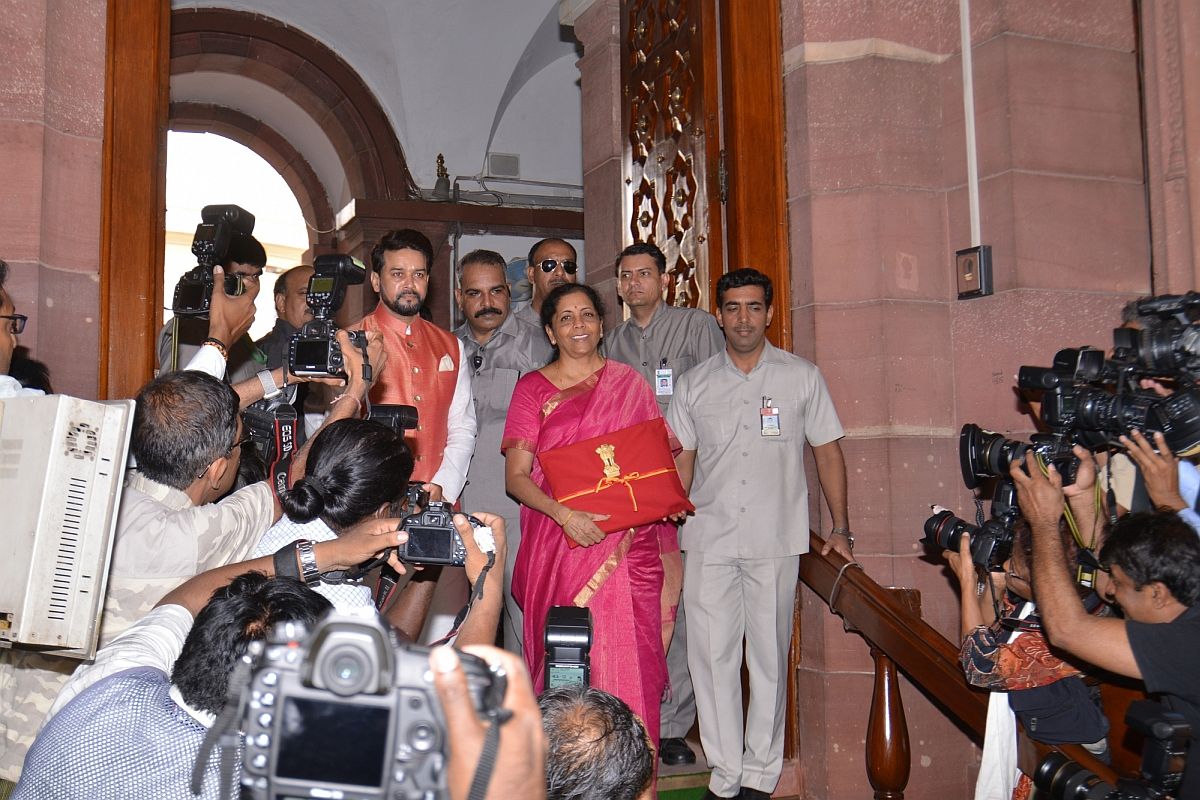‘Congress and the INDI Alliance conspiring to re-divide India,’ says Yogi
The UP chief minister said these parties (constituents of the INDIA bloc) aim to grant minorities the freedom to consume “food of their choice”.
The post-Balakot militaristic underpinning of its electoral campaign paid rich dividends for the BJP/NDA in the recent polls, but the much-hyped success of that air-strike in “enemy” territory had minimal impact on those controlling the government’s purse-strings.

Union Finance Minister Nirmala Sitharaman along with Union Minister of State for Finance Anurag Thakur, arrives at Parliament to present the Union Budget 2019. (File Photo: IANS)
The post-Balakot militaristic underpinning of its electoral campaign paid rich dividends for the BJP/NDA in the recent polls, but the much-hyped success of that air-strike in “enemy” territory had minimal impact on those controlling the government’s purse-strings. The outlay projected for defence by Mrs Nirmala Sitharaman last week was no different from the nearly Rs 319 lakh crore that had been proposed in the pre-Balakot interim budget in February. There is obvious dismay in the defence community that has long lamented the lack of funding for programmes to upgrade /modernise the combat and transport fleets of the IAF, the submarine and surface-combatants of the navy, the artillery and armoured elements of the army and to re-equip the force with state-of-art personal weapons, transport and communications. For all the government’s claims of giving the soldier the best-ever deal, the outlay remains a dismal share of GDP, and hardly matches the “muscle” articulated by the political leadership. Critics of Mrs Sitharaman perceive her niggardly allocation as in tune with her under-valuing the military, when as defence minister she had ordered the troops to clear the littler left behind by high-altitude trekkers, deployed army engineers to erect pedestrian overbridges on Mumbai’s suburban rail network, and opened to civilian traffic key roads in the Cantonments. And even worse, as finance minister she has presided over the withdrawal of the tax-waiver on disability pensions. If it is her case that the benefit was being misused (with some obvious bureaucratic connivance) surely detection and crackdown on cases of fraud would have been preferable to reopening old wounds, and forcing disabled veterans to carry to their graves the scars of injury sustained when fighting for the national cause. A military disenchanted on several fronts is what the nation call ill-afford when the Chinese continue to bolster their forces, and despite all the belligerence after Balakot there has no palpable decline in militant activity in the Kashmir Valley. As proven by the distasteful banners trailed by light aircraft over a World Cup cricket match in Headingly ~ in which Pakistan was not even playing. The government cannot afford to ignore such seething resentment ~ not that increasing the budgetary allocation for defence is in itself a panacea.
It is also imperative that the forces look within to ease the huge gap between revenue and capital expenditure. It has been long-warned that the increasing wage and pension bills limit the funds available for modernisation and re-equipment, now the shoe is pinching, painfully. Despite what the “brass” might believe, finances are not inelastic ~ the obsolete argument that it is for the government to find the resources is downright stupid, and a major rationalisation of manpower-usage is imperative. That re-working must come from within, and the government needs to muster the political will to force the military leadership into fresh thinking. Jingoistic rhetoric will not work, and the recent “mark time” defence budget is pitfall-ridden.
Advertisement
Advertisement